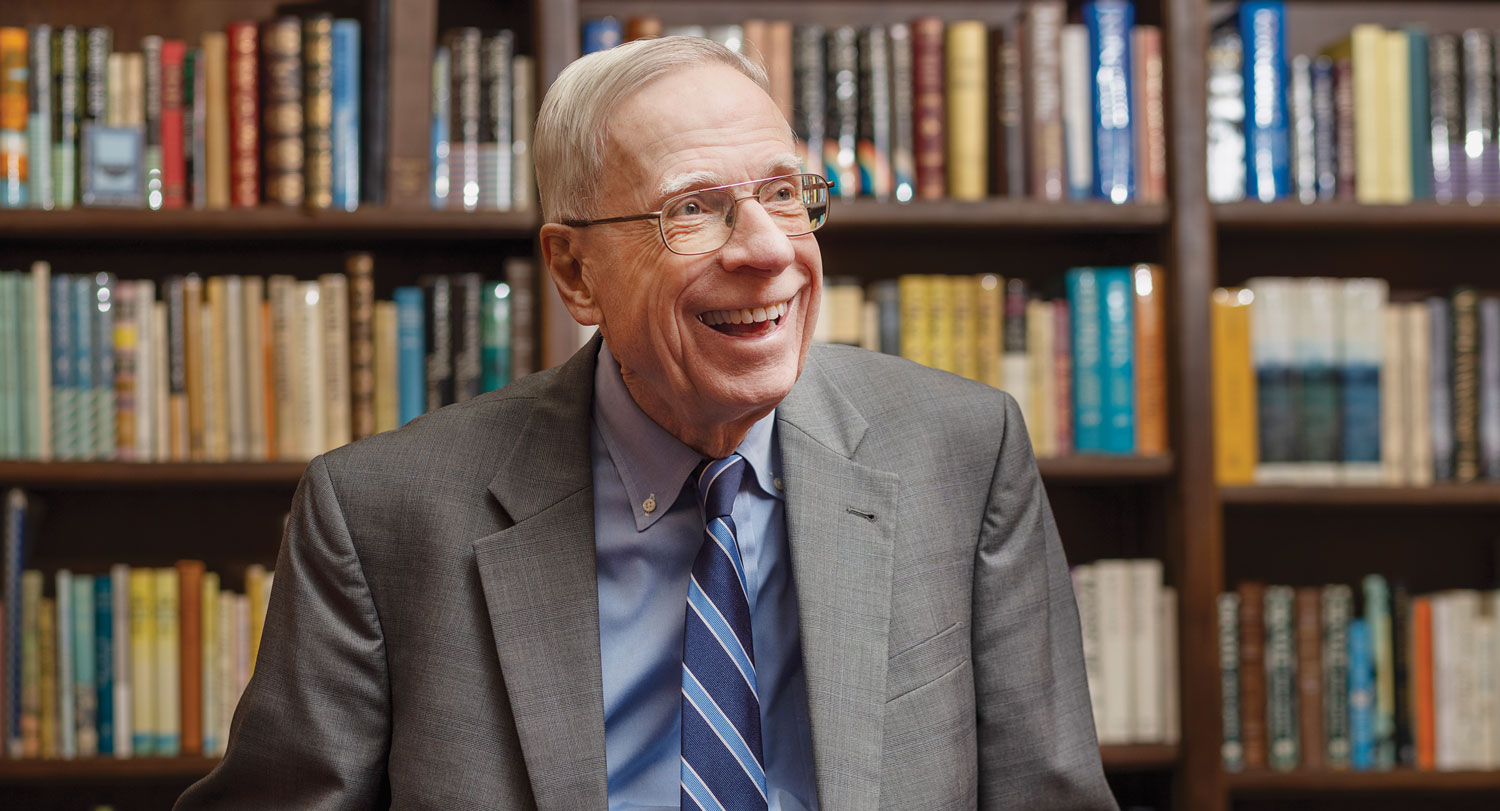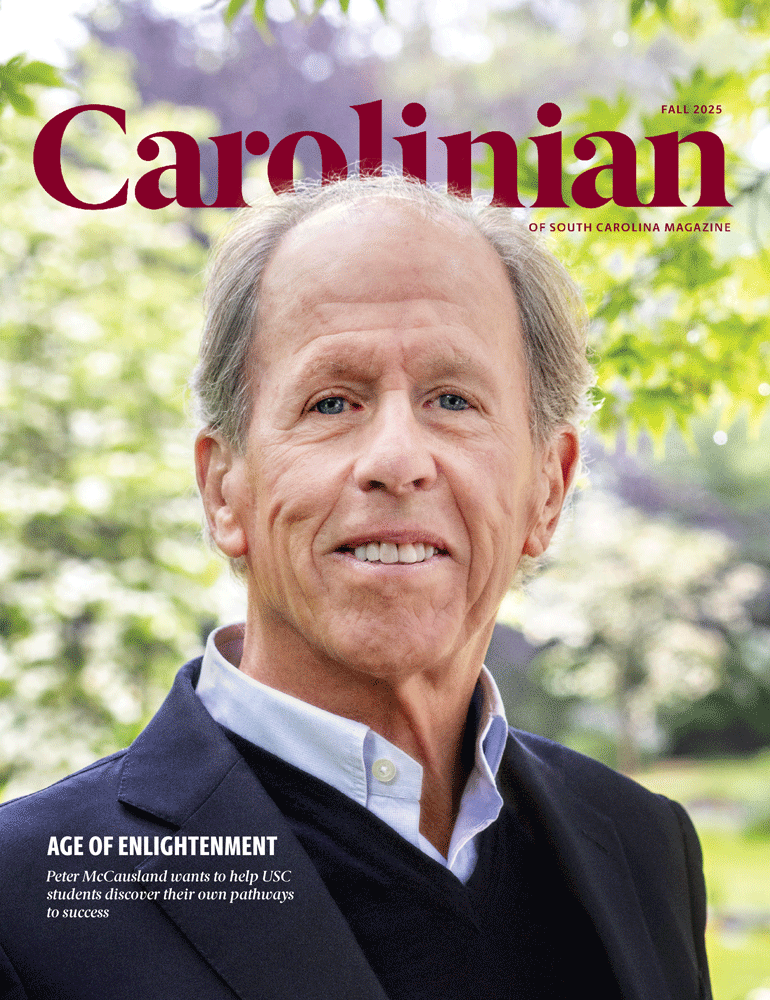It’s a cold winter morning as Don Greiner crosses campus in a coat and tie — the uniform he has worn nearly every day since joining USC’s English department faculty in 1967.
In his office at Thomas Cooper Library, floor-to-ceiling shelves are filled with books and journals devoted to American literature, especially all things John Updike. Every back issue of the John Updike Review includes an article penned by Greiner.
That Greiner, who officially retired from USC in 2004, still comes to campus underscores this bedrock truth: He is dedicated to the life of a scholar. Teaching and writing aren’t merely things to be done; they define who he is. But the long plotline of his academic career might never have happened if not for a serious childhood sickness.
At age 10 Greiner fell deathly ill, and not even his father, a chief pathologist, could make a diagnosis. Quarantined and confined to bed, the boy had only enough energy to lie quietly and read. Eventually he recovered and thought about becoming a physician — like father, like son. But those weeks spent reading books had planted a seed.
“The reading really started when I was sick — all the Hardy Boys mysteries, the old Tom Swifts, stuff like that,” says Greiner. “So, when I was a sophomore at Wofford College with organic chemistry and other pre-med courses hovering ahead, I spotted an elective that looked intriguing. It was titled ‘The Modern Novel,’ and I just had to get in.”
The course was open only to seniors, but Greiner talked the professor into making an exception. Soon, he was majoring in English instead of pre-medicine. His father wasn’t disappointed.
“After I had earned my Ph.D., he liked to introduce me as a doctor and then wait until you fell for it,” Greiner said. “The other person would ask me, ‘What’s your specialty?’ and I’d say, ‘Contemporary American literature.’”
The road to earning that doctoral degree turned out to be nearly as arduous as medical school might have been. Greiner was accustomed to cranking out three-page essays at Wofford, but his grad school profs at the University of Virginia demanded 25- to 30-page papers. On his first assignment, the professor wrote a cryptic note: ‘‘Well, Mr. Greiner, this isn’t much of anything, is it?”
“The other person would ask me, ‘What’s your specialty?’ and I’d say, ‘Contemporary American literature.’”
“He knew we couldn’t write!” Greiner recalls with a chuckle. “I obviously remembered that the rest of my life. I mean, when you think you’re God’s gift to literature as a magna cum laude and Phi Beta Kappa graduate and then you're assured that you’re not?”
Later, as the Carolina Distinguished Professor of English at Carolina, Greiner made it his practice to meet with students individually and review the initial paragraphs of their papers, offering advice on sharpening a thesis statement or tightening the scope of an essay well before it was graded. Many an undergraduate would learn how to write under his tutelage. One of Greiner’s fellow professors recalled overhearing students say, “I minor in Greiner.”
Despite his initial plan to teach at a small liberal arts college, Greiner signed on as a 27-year-old assistant professor in 1967. He poured everything he had into teaching and writing, and the results were evident. Seven years after his arrival, Greiner became the university’s youngest tenured full professor and would go on to collect more than a dozen major teaching awards and the university’s top research award.
He wrote 14 books, penned scores of journal articles and became a leading scholar on mid-century American authors. He served 36 years as editor-in-chief of the literary journal Critique: Studies in Contemporary Fiction and was associate provost and dean of undergraduate affairs for 11 years.
After 37 years at USC, Greiner hung up the coat and tie for a well-deserved retirement
— which lasted one summer. USC’s Honors College came calling, and he returned to the
classroom for seven more years. Now, nearly 60 years after his academic career began,
Greiner is still publishing. He is also still leading seminars
on American novels — at Still Hopes, the West Columbia retirement community where
he now lives.
“The residents aren’t writing papers, and their lives aren’t relying on a grade,” Greiner says, but in a recent session discussing J.D. Salinger’s conclusion of Franny and Zooey he noticed a familiar flicker. “The students — well, the senior citizens — had much the same reaction as I did as a 20-year-old at Wofford. It still gives me chill bumps when I read it — and they got it.”
When Greiner describes his Still Hopes seminars, it could just as easily be what he might have said about one of his undergraduate courses from 50 years ago. His students now are fellow octogenarians and there are no papers to grade, but no matter. The doctor is still in, and he specializes in contemporary American literature.

